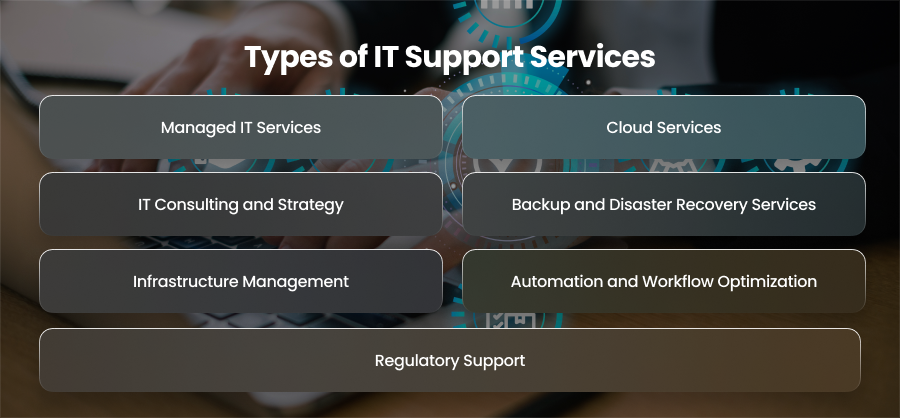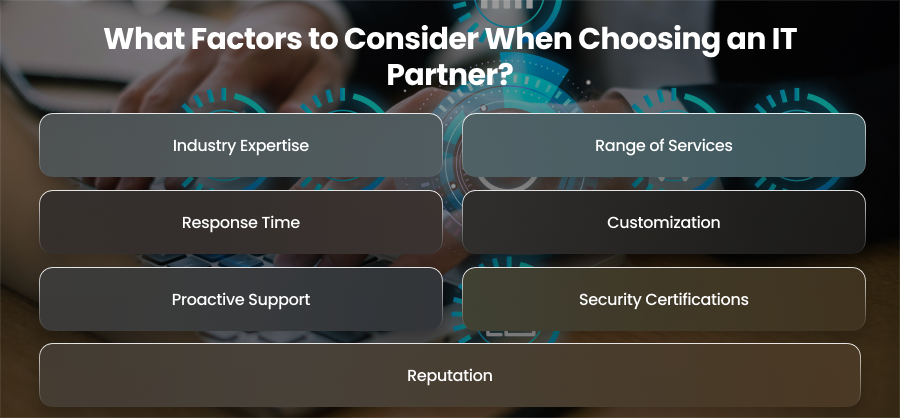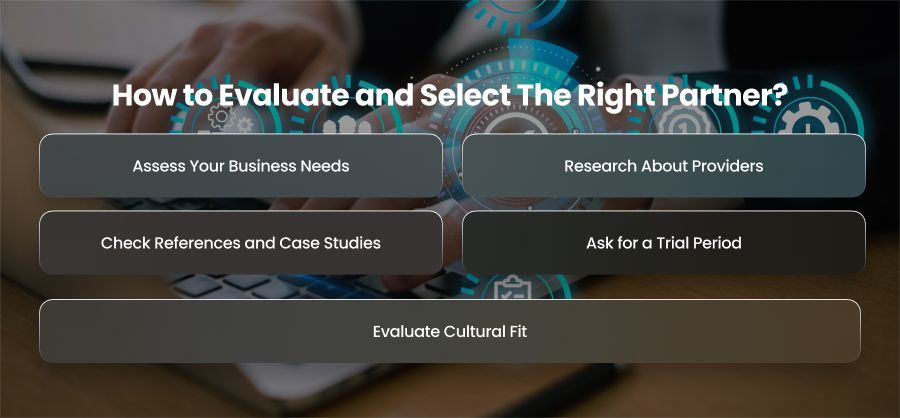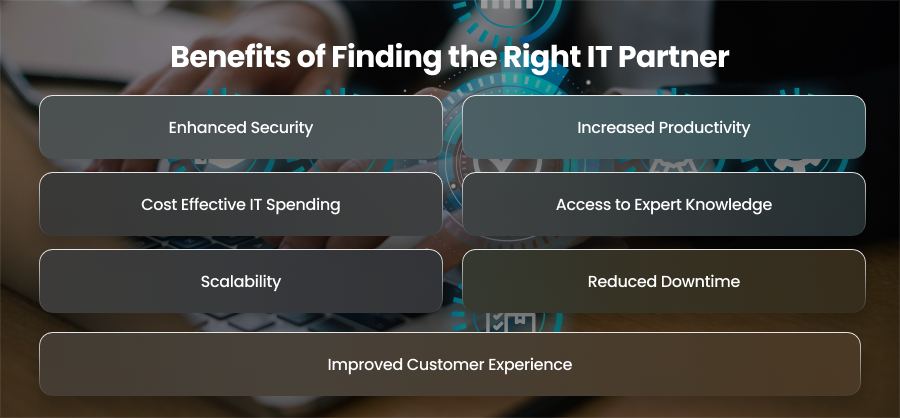Statista reports that IT spending has increased to $1.6 trillion. This is because in almost every business, technology is extremely important. IT systems keep everything operating smoothly, from handling sales transactions and consumer data to enhancing communication and automating repetitive work. However, even a little technological issue might cost time and money when these systems malfunction or aren’t optimized.
Therefore, having trustworthy IT help is becoming a must for small organizations. Therefore, in this article, we will examine the importance of trustworthy IT assistance for small businesses as well as how to evaluate and choose the best IT partner.
Why Small Businesses Need Reliable IT Support?
Cybersecurity
Small enterprises are becoming the focus of cybercriminals’ efforts and cybersecurity threats. They also target small firms since they don’t have strong cybersecurity defenses. Data breaches and ransomware are among the many dangers. Furthermore, a single successful hack might halt operations and result in losses. Therefore, reliable IT support mitigates this risk by implementing firewalls and monitoring system vulnerabilities.
Downtime
Even a short period of downtime can have outsized effect on a small business. Also, when critical systems go down, whether it’s your email or customer portal employees are left idle and business stops. Furthermore, these interruptions affect client relationships and sales in addition to time. Proactively monitoring systems and promptly addressing any technical issues are two ways that dependable IT assistance may significantly minimize downtime. Small companies may avoid the high expense of unforeseen changes and guarantee business continuity with their assistance. With their help, small businesses can ensure business continuity and avoid the high cost of unplanned outages.
Helpful for Small Teams
Employees in small businesses frequently take on many roles. Additionally, a sales manager frequently serves as the unofficial tech troubleshooter. Therefore, by handling common technical issues in a timely and professional manner, a reliable IT support team fixes this problem. A knowledgeable IT partner offers remote assistance so that staff members may concentrate on what they do best—growing the company—instead of your team fumbling with solutions.
Compliance
Concerns about data privacy and legal compliance are not exclusive to businesses. Many small enterprises work in highly regulated sectors. Furthermore, dependable IT assistance guarantees the security of your systems. They also conduct routine audits and set up safe data storage.
Technology is a Competitive Advantage
Small firms may automate repetitive operations and obtain insights through data analytics with the correct IT infrastructure. Additionally, having dependable IT assistance enables you to utilize the greatest resources, such as eCommerce integration or cloud collaboration software. They don’t just keep things running; they help you use technology as a growth driver.
Types of IT Support Services

Managed IT Services
Managed IT services offer a proactive and comprehensive approach to IT support. MSPs do routine maintenance and real-time system monitoring rather than waiting for anything to malfunction. Additionally, this strategy is perfect for small enterprises who need predictable expenses and steady uptime. Additionally, device management and system health monitoring are frequently included in managed services. Also, they provide backup recovery and cloud services.
Cloud Services
Cloud computing has changed how small businesses operate, enabling access to data and services from anywhere. IT support providers that offer cloud services can help you migrate to cloud platforms like Microsoft 360 or AWS. They also manage cloud storage and application hosting. Therefore, having professional assistance guarantees that everything is configured and performance optimized, whether you are utilizing cloud solutions for file sharing and customer relationship management. Furthermore, cloud services also enhance collaboration and remote work capabilities.
IT Consulting and Strategy
Some IT companies offer strategic consultation in addition to troubleshooting and system maintenance. These services are especially helpful for companies looking to match their technology to long term objectives. IT experts may also assist you in assessing new technologies and organizing digital transformation projects. Additionally, a strategic IT consultant can provide the guidance and vision needed to easily execute a significant upgrade, cloud migration, or data systems overhaul.
Backup and Disaster Recovery Services
Accidents can happen. Files can get deleted, and sometimes entire servers fail. Disaster recovery thereby guarantees that your company’s data is consistently backed up and can be promptly recovered In case of an emergency. Automated backups are also installed by a trustworthy IT supplier, especially in the cloud. This ensures business continuity even in the event of significant interruptions by reducing downtime.
Infrastructure Management
Network infrastructure forms the foundation of your digital environment. Also, IT support providers offer services to monitor and optimize your network performance. They ensure your business has fast and secure connectivity. Also, continuous monitoring helps detect outages or bottlenecks, while proactive management ensures smooth access to cloud tools and file servers.
Automation and Workflow Optimization
Some advanced IT providers offer automation tools to streamline your internal processes. These services have the ability to greatly increase productivity by automating data entry and developing unique interfaces between applications. Additionally, automation lowers human error and frees up teams to concentrate on more strategic work rather than monotonous duties.
Regulatory Support
Regulatory compliance is a growing concern, even for small businesses. Whether you are in healthcare or finance, an IT provider can help you navigate complex requirements. Moreover, they can secure sensitive data.
What Factors to Consider When Choosing an IT Partner?

Industry Expertise
Not all IT providers understand the needs of your industry. Whether you work in banking or retail, your company will gain from having a partner with similar expertise. Additionally, their knowledge of the market guarantees that they comprehend your operational aims and regulatory standards.
Range of Services
A good tech partner should be able to support all of your tech needs. This includes infrastructure setup and cybersecurity. Moreover, they should also offer cloud services and disaster recovery planning services. Also, choosing a partner with a comprehensive service portfolio means you won’t have to juggle multiple vendors or worry about any issues. Moreover, it also allows your IT environment to be managed more holistically.
Response Time
The speed at which an IT partner can react might be the difference between small annoyances and significant disruptions. As a result, you want to seek a supplier who provides guaranteed service level agreements that specify resolution timeframes. You should ask about average wait times and whether you will get a dedicated support team or not.
Customization
In a year or two, your custom software development requirements can change from what they are now. Finding a partner that provides scalable solutions that expand with your company is therefore essential. It’s also crucial that they customize their offerings to fit your unique infrastructure. Additionally, you should steer clear of one size fits all solutions that might not work for your workflow or expansion goals.
Proactive Support
Many IT providers can respond to problems, but the best ones prevent them. Proactive support means your systems are constantly monitored, and regular updates are applied without delay. Therefore, you should ask potential partners about their approach to system monitoring and preventive maintenance.
Security Certifications
Cybersecurity should be one of your top concerns when evaluating an IT partner. You should find out what kind of security protocols they have in place. Also, check whether they hold any certifications. Certifications demonstrate their commitment to best practices.
Reputation
A trustworthy IT partner will have a strong reputation among current and past clients. Therefore you should loot at online reviews and testimonials. Also, you should ask for better references. Hence, this will give you insight into how they handle real world challenges and whether their clients feel supported.
How to Evaluate and Select The Right Partner?

Assess Your Business Needs
First, you should identifying your current pain points and technical requirements. This could be:
- Enhanced cybersecurity
- Data backup and recovery
Moreover, take stock of your existing infrastructure and pinpoint the gaps. This includes:
- Software
- Cloud systems
- Communication tools
Also, understanding what you need helps you filter out providers that don’t align with your expectations and ensures you are not paying for services you don’t require.
Research About Providers
Once you have defined your needs, you should begin researching IT companies that specialize in supporting small businesses. Furthermore, you should look for vendors with proven experience in your industry. Also, you should look for the following:
- Check online reviews
- Testimonials
- Case studies
Furthermore, you can also look at the following platforms for researching providers:
- Clutch
- G2
- Google Reviews
Check References and Case Studies
Sharing case studies or references won’t be a problem for trustworthy IT staff augmentation companies. To receive direct feedback on their experience, you should also get in touch with a handful of their previous or present customers. Inquire about the provider’s professionalism and technical proficiency as well.
Ask for a Trial Period
If possible, see if the provider offers a short term trial. Additionally, it allows you to assess their problem-solving and response abilities in a real world setting. Their talents and service culture may be seen through even a small scale endeavor.
Evaluate Cultural Fit
Lastly, you should asses the partner’s communication style and compatibility with your team. Are they proactive in follow ups? Do they explain things clearly, without tech jargon? A good IT partner should feel like an extension of your business and committed to your success.
Benefits of Finding the Right IT Partner

Enhanced Security
Small businesses are often the most susceptible to cybersecurity attacks because of their low resources. A capable IT partner would also proactively deploy reliable measures like intrusion detection systems. They also closely monitor your systems and help you satisfy regulatory requirements.
Increased Productivity
Productivity is killed by downtime. The best IT partner ensures that your systems continue to function with the fewest potential disruptions by offering real-time monitoring. They free up your internal team to focus on critical business tasks rather than technological issues by automating your operations.
Cost Effective IT Spending
Instead of unpredictable bills, the right partner offers clear and consistent pricing models. Whether through a monthly managed service plan or a customized package, they help you budget smarter and avoid surprise expenses. Moreover, their preventive approach also helps avoid costly downtime or data loss.
Access to Expert Knowledge
Generally speaking, startups lack the funds to employ an internal group of IT experts. Thus, you may access a pool of experts in other fields if you find the suitable partner. They also keep you updated with latest tools and technologies.
Scalability
A great IT partner helps you prepare for tomorrow’s growth. Your company’s technological demands will grow along with it. Additionally, the ideal supplier will facilitate the smooth expansion of your infrastructure. Also, they can recommend solutions that align with your long term goals.
Reduced Downtime
Every minute matters when a problem occurs. The right support partner offers rapid response services and remote troubleshooting. Additionally, this speedy response reduces expensive delays and unhappy customers. Furthermore, a lot of them make use of proactive monitoring systems that notify them of issues before you do.
Improved Customer Experience
When your internal system run smoothly, your customers benefit too. Also, faster service and uninterrupted operations lead to better customer satisfaction. Also, an IT partner ensures that the technology supporting your customer facing activities is reliable.
Final Words
Thus, small businesses may function securely and effectively by selecting the appropriate IT support partner. The advantages are many and range from increased productivity and cost savings to competitive advantage. Furthermore, technology becomes a tool for success rather than a barrier when the correct partner is involved.




